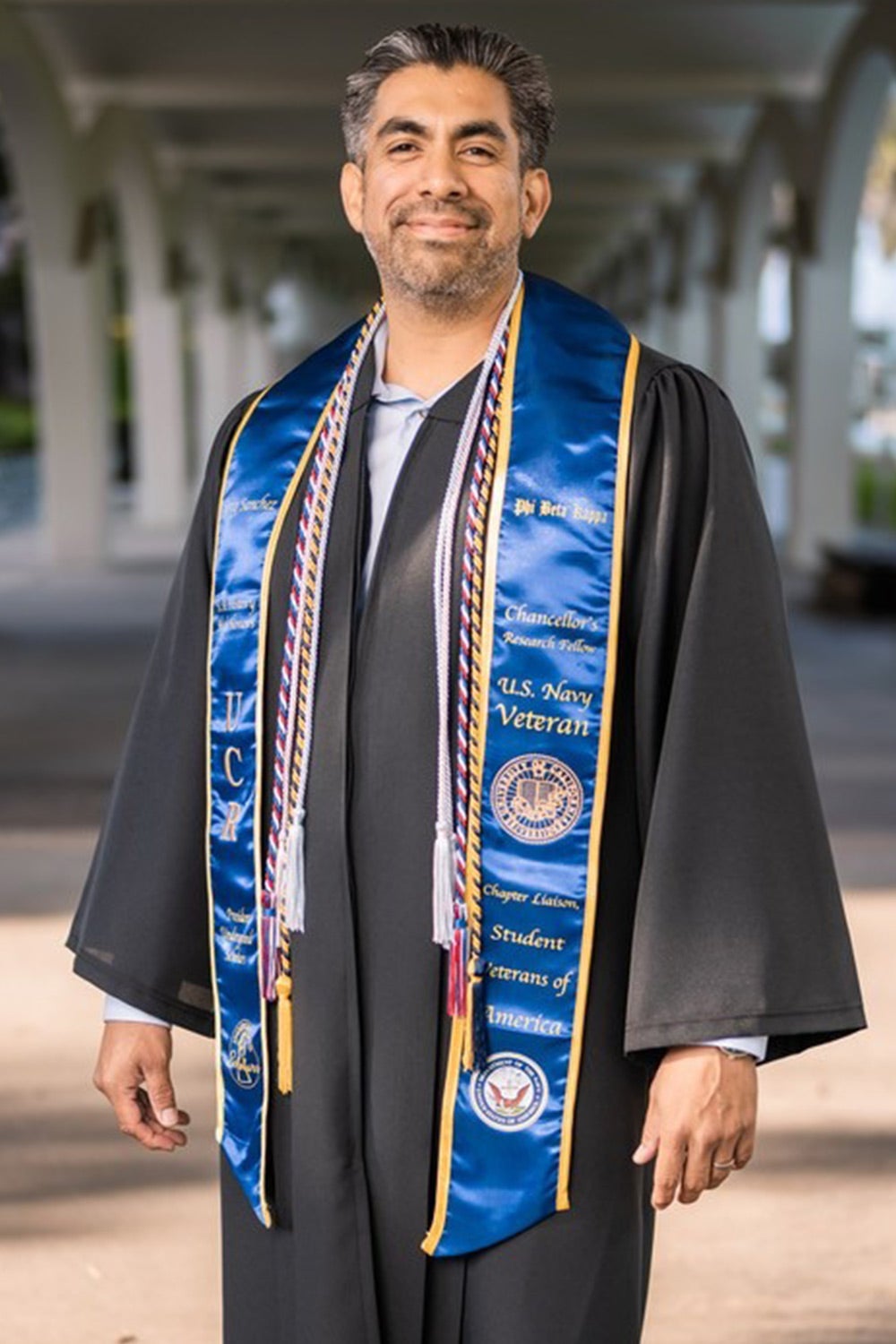ALUMNI PROFILE
In Service of Veterans
Greg Sanchez combines his lived experience and education to advocate for fellow veterans
By Laura Ferreiro
G reg Sanchez is the poster child for his work as an advocate for veterans. After leaving active service, he struggled in the civilian world, finding himself in front of a Riverside judge before tapping into the GI Bill to turn his life around. Today, Sanchez serves as assistant director of the Office for Military-Affiliated Communities at the University of Chicago, helping veterans transition to civilian life and leverage their military benefits to pursue higher education.

An Inland Empire native, Sanchez enrolled in community college after high school but pivoted after 9/11 to join the U.S. Navy, where he served in an engineering role until he left active service in 2007. Like many veterans, Sanchez experienced mental health challenges after returning home. When the recession hit in 2008, these issues were exacerbated.
“I ran out of options after submitting my resume everywhere,” he said of his difficulty finding a job. “I was unable to keep my apartment, so I ended up couch surfing and living in people’s garages, doing what I could to survive.”
Eventually Sanchez secured employment, but his mental and physical health continued to decline. A turning point came in 2018 when Sanchez was arrested, convicted of three felonies, and sentenced to Veterans Treatment Court (VTC), which provides tailored support for veterans in lieu of incarceration.
“While in VTC, the judge gave me two options — maintain full-time employment or use my veterans benefits to pivot into a vocation of my choice,” he said.
Sanchez chose to use the GI Bill to go back to school. He started by attending Mt. San Jacinto College, where he earned three associates degrees with honors and distinction. He then pursued a bachelor’s degree in history at UCR. Not only did he excel academically, he also served as president of UCR’s Underground Scholars Initiative, a grassroots, student-driven program that supports formerly incarcerated and system-impacted scholars at UCR and other UC campuses.
“It was a great responsibility to represent a population of people looking to restore themselves and uplift their peers by way of higher education, and to advocate for system-impacted individuals,” Sanchez said. “Society owes a great deal to people seeking out ways to make positive changes while refusing to allow their past experiences to define them. These people sought out higher education to do just that.”
During Sanchez’s tenure as president of Underground Scholars, the organization was named the No. 1 student organization at UCR. Word of Sanchez’s work got out, and he was recruited by the University of Chicago to pursue a graduate degree and lead the university’s Veterans Restorative Justice Project. A few months after graduating from UCR in 2022, Sanchez moved to Chicago.
At the University of Chicago, Sanchez’s Office of Military-Affiliated Communities partners with the Illinois court system to provide resource support and academic research to enhance VTCs throughout Chicago. The partnership brings things full circle for Sanchez, who credits VTC with saving his life.
“These veterans have struggled with transitioning out of the military by way of unaddressed military-related trauma,” Sanchez explained. “Many fall into circumstances where substance use disorders have developed to help them cope with PTSD, military sexual trauma, and more. Since I served in the military, went through my own mental health issues, and am a formerly incarcerated individual myself, I believe I’m well equipped to understand how to help them navigate these issues.”
Sanchez recently completed a master’s degree in public policy at the University of Chicago’s Harris School of Public Policy, further equipping him to advocate on policy issues for veterans. In April, he was announced as a nominee for the 2025 HigherEdMilitary Spotlight Award, which highlights higher education professionals who are innovating to change, grow, and support the military-affiliated population.
Sanchez credits several people at UCR with helping him on his path to success, including Tamara Thacker, director of UCR’s Veterans Resource Center, and Alejandra Dubcovsky, a professor of history who served as Sanchez’s faculty advisor when he was chosen for a Chancellor’s Research Fellowship. But it was fellow history student Carlos Cruz, past president of Underground Scholars, who gave Sanchez the confidence to use his story to help others.
Few people knew of my past involvement with the carceral system as I buried it deep,” Sanchez said. “Carlos is such an easy person to talk to … his support empowered me to lean into my story and use it as a beacon of hope and inspiration for others who could use a helping hand as they sought to restructure their lives.”
Return to UCR Magazine: Spring 2025